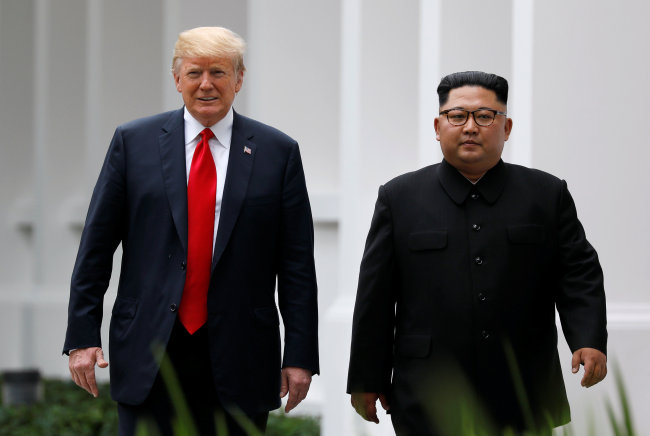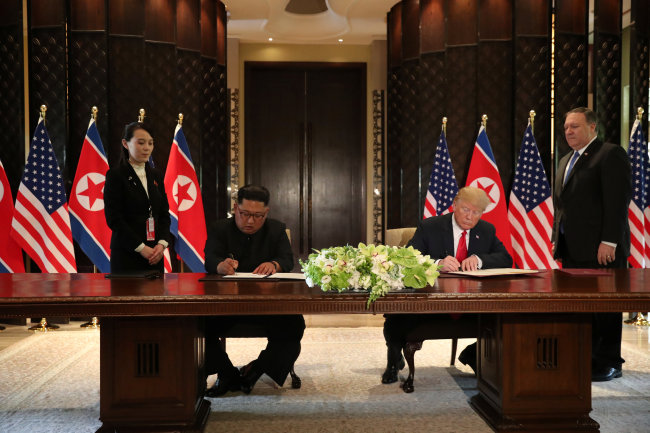WASHINGTON -- If Donald Trump’s high-stakes, long-odds bet on building peace with North Korea pays off, it will be because he confidently dismissed all expert advice, moral qualms and diplomatic norms.
Only a president like Trump could celebrate a ruthless autocrat like Kim Jong-un as a man who “loves his country,” but then maybe only a Trump could kick-start such a peace process.
Less than a year ago, Kim’s accelerating pursuit of a nuclear-armed long-range missile provoked the US president into a blood-curdling threat to unleash “fire and fury.”
Now, Trump has handed Kim an extraordinary propaganda coup, meeting him on an equal footing and shaking his hand in front of an overlapping array of US and North Korean flags.

(Reuters)
According to Trump’s own State Department, Kim’s regime holds between 80,000 and 120,000 political prisoners in forced labor camps, facing torture and forced starvation.
The autocrat is accused of killing his half brother with a dose of nerve agent in a Malaysian airport, and his regime recently sent a detained US student home in coma from which he never recovered.
Pyongyang has signed agreements vowing to halt its nuclear program in the past, only to renege on them and then race to build a thermonuclear arsenal and a ballistic missile program.
So Kim’s own gamble has already paid off. The economic sanctions campaign targeted against him is fraying and his rule has been publicly legitimized by Trump’s warm embrace.
But has Trump’s leap in the dark succeeded? Trump says he trusts that Kim’s commitment to “work toward” the denuclearization of the Korean Peninsula is genuine -- with a big caveat.
“I may be wrong. I mean I may stand before you in six months and say, ‘Hey I was wrong,’” he said. “I don’t know that I’ll ever admit that, but I’ll find some kind of an excuse.”
There is no shortage of voices in Washington to denounce Trump’s apparently naive effort to nudge Kim onto the path toward disarmament without extracting concrete concessions.
The Brookings Institution published reactions from 13 of the most respected US-based experts on the crisis, and all but one was critical of the “underwhelming” outcome of the summit.
Even the lone optimist among them, senior fellow Michael O’Hanlon, said the process must now pass from Trump to Secretary of State Mike Pompeo to plan the North’s verifiable disarmament in detail.
- Talented and tough -“Only when we see if North Korea will go along with this kind of plan, and begin its verifiable implementation, will we really know how to evaluate what just happened in Singapore,” he said.
Supporters and critics of Trump alike, in fact, noted that now the ice-breaking summit is over it is vital to move quickly to a more traditional negotiation of concrete steps.
But, as some of Trump’s fans insist, did it need a buccaneering figure like Trump to cast diplomatic niceties and squeamishness about human rights aside to break the diplomatic logjam?
There may be something to that.
Perhaps only a figure like Trump could pivot so swiftly from “maximum pressure” and “fire and fury” to praising a “talented” Kim’s “tough” rule.
And maybe Trump could only do so because he had run out of other options after the North had essentially proved the efficacy of its nuclear program.
Kim’s regime has tested what informed observers believe was a hydrogen bomb and a multistage missile capable of reaching US cities, and his next goal is international recognition.
Trump’s administration initially reacted with bluster and threats and then worked through the United Nations and with cautious rival China to impose tough sanctions.
US officials remain very proud of the sanctions regime, even if Trump says he doesn’t want to use the term “maximum pressure” any more, but it has shown its limits.

US President Donald Trump and North Korea`s leader Kim Jong-un sign documents that acknowledge the progress of the talks and pledge to keep momentum going, after their summit at the Capella Hotel on Sentosa island in Singapore Tuesday. (Reuters)
The only option left to Trump was to perform a 180-degree turn and accept an invitation -- passed to him via a nervous South Korea -- to the one-on-one summit that Kim was seeking.
For Stephen Pomper, a former member of former President Barack Obama’s National Security Council now working at the International Crisis Group, Trump was the man for the moment. “It‘s a win in a sense because he backed himself out of a corner, a dangerous corner, and put the United States back on the track where now there’s a process, we‘re now talking to the North Koreans,” he said.
“Nobody inside the United States government wanted to take responsibility for pivoting to diplomacy, because if the diplomacy doesn’t work out then that person ends up with egg on their face.
“The president absorbed that political risk himself by saying that he was going to commit to this meeting, and that‘s really where he deserves credit,” Pomper told Agence France-Presse.
So Trump got America out of the corner he himself had trapped it in without triggering a nuclear war. Now diplomats and technical experts must step in to set up an inspection and verification program.
If Kim allows monitors onto his soil, if they confirm that he has frozen his nuclear program, if he declares the full extent of his capabilities, if he agrees that “denuclearization” means disarmament -- then maybe the parties can talk about his surrendering the bombs he already has. (AFP)


![[Herald Interview] 'Amid aging population, Korea to invite more young professionals from overseas'](http://res.heraldm.com/phpwas/restmb_idxmake.php?idx=645&simg=/content/image/2024/04/24/20240424050844_0.jpg&u=20240424200058)




